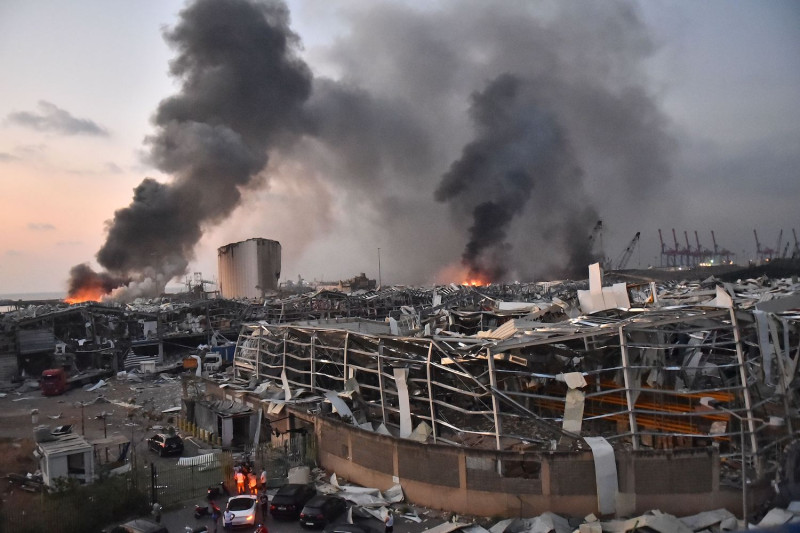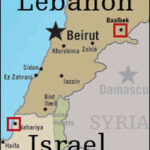The Lebanese capital, Beirut, was last Tuesday rocked by the most devastating blast in the history of the country.
It was so massive that the associated shockwaves were felt in Cyprus 240 kilometres away. It left more than 130 dead, more than 5000 wounded and extensive destruction, particularly in and around the seaport facilities where it occurred.
- Beirut Explosion: What is ammonium nitrate?
- Lebanon: Two huge Beirut explosions kill 73, injure thousands
According to the Governor of Beirut, Marwan Abboud, the blast could be compared to the United States nuclear attacks on the Japanese cities of Hiroshima and Nagasaki in 1945 during World War II, which were the first and so far the only incidents of nuclear attacks in the world.
He also estimated the cost of the resultant damage to be between three to five billion US Dollars, which is too much to bear for a desperately struggling economy like the Lebanese economy.
The country’s President, Michel Aoun, was quick to attribute the incident to an accidental explosion of “2,750 tonnes of ammonium nitrate (which) had been stored unsafely in a warehouse for six years.”
However, it’s widely believed among informed observers and analysts on Middle East affairs, and, of course, within intelligence communities in the region and beyond that the blast was never accidental, and, instead, it was just one of the similar “mysterious” incidents that characterise the Israel-Iran tensions over the past several years.
Of course, as far as those with little or no understanding of the intricacies of the underlying politics of the Israel-Iran tensions are concerned, the incident remains as officially explained by the Lebanese authorities, or it’s simply mysterious in the absence of any definitive contrary official narrative about the alleged party responsible for it or the targeted party.
Whereas, the incident was never accidental or even isolated for that matter.
It was actually one of the series of surgical clandestine missile or aerial strikes that Israel has been conducting over the past few years on Iranian military facilities and factories within Iran and its military bases and sponsored militia units and their logistics facilities across Iraq, Syria and Lebanon.
This is though Israel has never officially admitted nor denied responsibility for any of such attacks, while the Iranian authorities, which even though know deep down that Israel has always been responsible, have never held it responsible either.
That further explains the confusion of casual observers who are not familiar enough with the relevant politics involved, especially considering the aggressive rhetoric that the two countries always trade against each other.
Over the past two months, in particular, Israel has intensified its attacks on various military targets and facilities within Iran including its Natanz nuclear project complex, gas pipelines, military factories and other sensitive facilities.
Also, for several years, Israel has been attacking Iranian military sites and its sponsored militia units across Syria, of course with the covert approval if not overt connivance of the Russian military in the country, which is supposed to protect the Bashar Al-Assad’s regime and its Iranian allies. (I may address the dynamics of Russian “betrayal” of President Assad in this regard in another piece).
Likewise, across Iraq, various Iranian military units, bases of the Iranian-backed militias and armouries have been the targets of Israeli attacks.
Also, in addition to Israel’s intermittent attacks on the Iranian-sponsored Hezbollah militia in Lebanon, it has equally conducted covert and sometimes more devastating attacks on some secretive or disguised facilities of the militia within the country.
Even the recent attack in Beirut wasn’t targeted at the state of Lebanon per se, after all; it was instead believed to have been targeted at a massive alleged Hezbollah armoury disguised as a seaport facility.
By the way, by manipulating the false pretext of resisting the Israel occupation of Palestine, Hezbollah militia, which is believed to be stronger than the Lebanese military itself, is the only armed political player in Lebanon, which enables it to hold the country to ransom and dictate state policies according to the dictates of the militia’s Iranian sponsors in faraway Tehran.
Now, understanding the logic behind Israel’s reluctance to admit responsibility for such attacks and Iran’s pretended obliviousness of Israeli’s responsibility requires looking at the underlying tactical and strategic considerations of both parties.
On the part of Israel, in order to keep the support of the global powers that it has always enjoyed and manipulated at the expense of Palestinians on whose confiscated territories it was created in 1948, and even though it’s the strongest military power in the region, it feigns vulnerability in the face of the persistent, albeit actually empty, existential threats from Iran since its transformation into a theocracy following the Khomeini-led revolution in 1979.
While on its part, Iran’s bogus commitment to eliminating the state of Israel, which its leaders have always chanted has been its most effective political capital among the gullible across the Muslim world it, in fact, partly owes its survival to it.
To maintain it, therefore, it has to keep making threatening but empty rhetoric against Israel and to also keep sponsoring purported anti-Israeli militias e.g. Hezbollah and Hamas and manipulating them to conduct reckless adventures in the name of attacking Israel, which in turn retaliates with disproportionate force to kill as many vulnerable Palestinians or Lebanese as possible and destroy their properties and infrastructure.
This is even though it (i.e. Iran) has a supposedly strong military, yet it has never targeted Israel and won’t’ dare to; obviously, its military is actually only intended for the pursuit of its expansionist agenda at the expense of Muslim nations.
Israel, therefore, capitalises on these dynamics to undermine Iran and its sponsored militias through such “mysterious” attacks knowing that Iran would rather continue to feign obliviousness of Israel’s responsibility for the attacks and continue to suffer in silence than to hold it responsible, for it realizes that, by so doing, its largely gullible fans would rightly expect it to retaliate while, in reality, it’s never and indeed has never been serious in its threats against Israel in the first place.

 Join Daily Trust WhatsApp Community For Quick Access To News and Happenings Around You.
Join Daily Trust WhatsApp Community For Quick Access To News and Happenings Around You.


